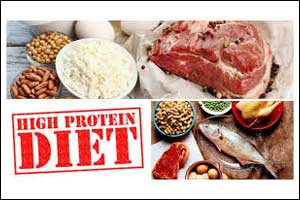- Home
- Editorial
- News
- Practice Guidelines
- Anesthesiology Guidelines
- Cancer Guidelines
- Cardiac Sciences Guidelines
- Critical Care Guidelines
- Dentistry Guidelines
- Dermatology Guidelines
- Diabetes and Endo Guidelines
- Diagnostics Guidelines
- ENT Guidelines
- Featured Practice Guidelines
- Gastroenterology Guidelines
- Geriatrics Guidelines
- Medicine Guidelines
- Nephrology Guidelines
- Neurosciences Guidelines
- Obs and Gynae Guidelines
- Ophthalmology Guidelines
- Orthopaedics Guidelines
- Paediatrics Guidelines
- Psychiatry Guidelines
- Pulmonology Guidelines
- Radiology Guidelines
- Surgery Guidelines
- Urology Guidelines
Choose Proteins wisely for health of Heart- AHA

High-protein diets are available in plenty but not all proteins are qualitatively equal. The experts feel that the key is moderation and choosing wisely for the health of heart.
“Very high intake of meat, especially processed red meat, is not good for overall health,” said Dr. Jyrki Virtanen, author of a recent study on protein consumption. “Those who are used to eating very high amounts of meat could consider moderating their intake.”
The U.S. Department of Agriculture’s recommendation for protein is 0.8 grams of protein per kilogram of body weight – or about 0.36 grams of protein per pound of body weight. For a 155-pound adult, that’s roughly 56 grams. For a 190-pound adult, it’s about 68 grams. The USDA has a calculator to help determine a recommended daily allowance.
Virtanen’s study found middle-aged and older men who ate higher amounts of protein were slightly more likely to develop heart failure than men who ate lower amounts. He and his colleagues looked at data from 2,441 Finnish men over two decades and found 334 cases of heart failure. The results showed men who consumed the highest amount of protein had a 33 percent higher increased risk of heart failure than men who consumed the lowest amounts.
“More research on this topic is definitely needed,” said Virtanen, an adjunct professor of nutritional epidemiology at the University of Eastern Finland. “But our findings indicate that high protein intake may have some adverse effects on health, especially if the protein is coming from animal sources.”
Just what kind of protein is best for cardiovascular health is a question that’s evolved in recent years.
A study in November said eating a mostly plant-based diet was associated with a 42 percent reduced risk of developing heart failure for people with no history of heart disease.
The American Heart Association’s lifestyle recommendations for reducing cardiovascular risk emphasize a healthy eating pattern that includes:
- Eating a variety of fruits and vegetables, whole grains, non- and low-fat dairy products, skinless poultry, fish, nuts, beans and non-tropical vegetable oils.
- Limiting red and processed meat, sweets and sugary drinks.
Still, many people cling to the notion of eating lots of meat and protein, fueled in part by the enduring popularity of low-carb, high-protein diets such as Paleo, Ketogenic, Atkins and the Zone, said Jo Ann Carson, a dietitian, and professor at UT Southwestern Medical Center in Dallas.
“But if you use that very high protein diet to lose weight, typically the only way to keep that weight off is to continue to follow that dietary pattern, and there might be potential health issues there,” said Carson, chair of AHA’s nutrition committee.
“Probably the biggest problem with large amounts of protein is when it doesn’t leave room in your diet for antioxidant-rich and fiber-rich fruits and vegetables and whole grains,” Carson said.
In May, the AHA issued a new advisory recommending people up to their intake of omega-3 fatty acids by eating one or two servings of non-fried fish or shellfish a week. Carson said fish was among “the good-quality proteins people should be looking for, including lower-fat dairy and plant-based proteins, like soy and quinoa.”
As people get older, their protein requirements typically increase, Carson said. But no matter their age, people confused about their protein intake should seek out an expert.
“I think it’s a good idea to work with a registered dietitian, especially if you have a family history of heart disease,” she said. “They can tell you ‘This is a healthy diet’ or ‘You’re getting enough protein, but the rest of your diet needs work.’ Much more important than the amount of protein you eat is the quality of your protein.”
For more details click on the link:
https://news.heart.org/when-it-comes-to-protein-quality-is-more-important-than-quantity/

Disclaimer: This site is primarily intended for healthcare professionals. Any content/information on this website does not replace the advice of medical and/or health professionals and should not be construed as medical/diagnostic advice/endorsement or prescription. Use of this site is subject to our terms of use, privacy policy, advertisement policy. © 2020 Minerva Medical Treatment Pvt Ltd